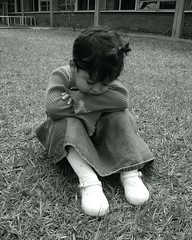 A new study finds that children who are depressed are more likely to become the target of bullies than their happier peers are. There are a number of reasons that explain why this happens. The affects of being depression last for much longer than the actual incident of being bullied does.
A new study finds that children who are depressed are more likely to become the target of bullies than their happier peers are. There are a number of reasons that explain why this happens. The affects of being depression last for much longer than the actual incident of being bullied does.
Depression is a mental illness that can affect people of any age. This includes adolescents and children, as well as adults. Some parents may not be aware that it is even possible for their child to be experiencing a serious depression, (especially if their kid is still in elementary school). It is a good idea for parents to take the time to learn about the signs that indicate that their child could be depressed.
A study, that was recently published in the Child Development journal found that children who show signs of depression end up having social difficulties. They get shunned by their peers, and they attract the attention of bullies. Researchers are unable to figure out what comes first, the depression, or the bullying. It is clear that the two situations are connected to each other.
Children who are depressed cry easily. They also express their negative emotions. This could come in the form of verbalizations about the things that are bothering them, or that they find to be upsetting. Depressed people, both adults and children, tend to be very negative. They also are likely to engage in inappropriate self-disclosure.
It is these behaviors that make the peers of the depressed child uncomfortable. Being around a classmate who is always sad, who constantly complains abiout things, and who “overshares” is difficult. Often, the other kids will shun the child who is depressed. Which, of course, leads to more depression.
Bullies focus their attention on kids who they feel are easy targets. They like to pick on kids who are not accepted by the rest, or children who they can provoke into a big reaction. Kids who are depressed cry easily. They probably don’t have a social network of friends who will come to their aid. Children who are bullies notice this. Obviously, being the target of a bully can make a child even more depressed.
The children in the study were periodically gaged for symptoms of depression. Researchers also noted information about how well or poorly the child was socially accepted by his or her peers. The researchers found that fourth grade students who showed signs of depression were more likely than their peers to become the victim of a bully in fifth grade. They also found that the kids who were picked on in fifth grade were less likely to be accepted by their peers in sixth grade.
On the other hand, the researchers didn’t find the converse to be true. There was little evidence that children who had been the victims of bullies were more likely to become depressed later on, when they got to fifth or sixth grade. Researchers also do not know what, specifically, the depressed children did that initially “turned off” their peers.
Image by Axel on Flickr

